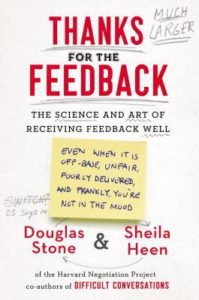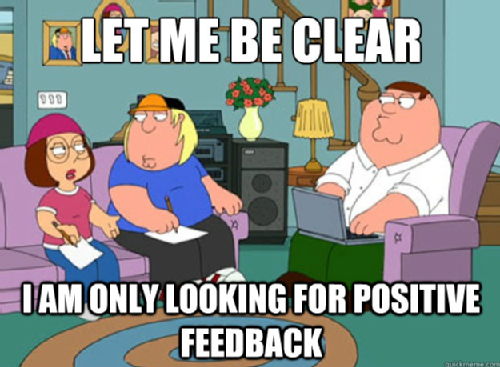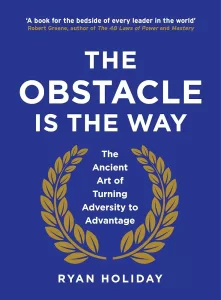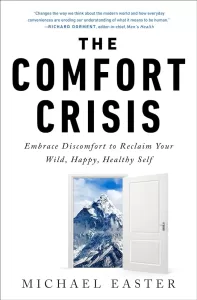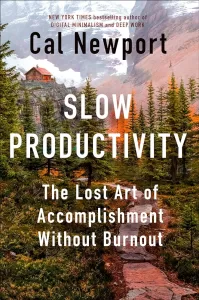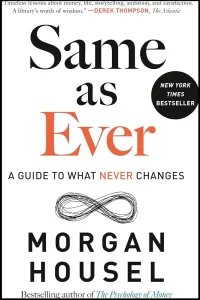Book Review: “Thanks for the Feedback”
Book: Thanks for the Feedback by Douglas Stone and Sheila Heen
Reviewer: Bobby Powers
My Thoughts: 9 of 10
Books like Crucial Conversations and How to Win Friends and Influence People teach how to give tough messages. Thanks for the Feedback addresses the other side of the conversation: how to understand and respond to feedback. I cannot express how much I learned from this book. Stone and Heen tackle a difficult topic (receiving feedback can be really tough) with honesty and real-world examples. I'm sure I'll still wince the next time I receive a tough message from my wife, co-worker, or boss, but this book gave me a good framework for receiving and understanding feedback.
Takeaways from the Book
Strive to Learn from Everyone—Regardless How They Give Their Message
- The majority of our learning will come from people who are not adept at giving feedback, so “if we're serious about growth and improvement, we have no choice but to get good at learning from just about anyone.”
- “Receiving feedback well doesn't mean you always have to take the feedback. Receiving it well means engaging in the conversation skillfully and making thoughtful choices about whether and how to use the information and what you're learning. It's about managing your emotional triggers so that you can take in what the other person is telling you, and being open to seeing yourself in new ways.”
- “Identity is the story we tell ourselves about who we are and what the future holds for us, and when critical feedback is incoming, that story is under attack.” We need to see the feedback for what it is: feedback about the situation—not feedback condemning who we are as a person.
Three Forms of Feedback
- Appreciation (thanks)
- Coaching (here’s a better way to do it)
- Evaluation (here’s where you stand)
“Each form of feedback—appreciation, coaching, and evaluation—satisfies a different set of human needs. We need evaluation to know where we stand, to set expectations, to feel reassured or secure. We need coaching to accelerate learning, to focus our time and energy where it really matters, and to keep our relationships healthy and functioning. And we need appreciation if all the sweat and tears we put into our jobs and our relationships are going to feel worthwhile.”
Work to First Understand the Feedback
- “The better you understand the feedback, the more likely you are to find something in it that is useful, or at the very least to understand the ways in which you are being misunderstood, and why.”
- “Even if you decide that 90 percent of the feedback is off target, that last golden 10 percent might be just the insight you need to grow.”
- “We judge ourselves by our intentions, while others judge us by our impacts.”
- “Talk about intentions and impacts separately: ‘I’ve been working hard to be more patient. And yet it sounds like that’s not the impact I’m having. That’s upsetting. Let’s figure out why.’”
Two Very Different Personal Mindsets
- Fixed Mindset: “Whether we are capable or bumbling, lovable or difficult, smart or dull, we aren’t going to change. Hard work and practice won’t help; we are as we are. Feedback reveals ‘how we are,’ so there’s a lot at stake.”
- Growth Mindset: “These folks see themselves as ever evolving, ever growing…How they are is simply how they are now. It’s a pencil sketch of a moment in time, not a portrait in oil and gilded frame. Hard work matters; challenge and even failure are the best ways to learn and improve. Inside a growth identity, feedback is valuable information about where one stands now and what to work on next. It is welcome input rather than upsetting verdict.”
Encourage Productive Disagreement and Feedback
- "Explicit disagreement is better than implicit misunderstanding.”
- “Even when we have access to the same data, we tend to notice different things.”
- “In fact, we’re both biased, and we each need the other in order to see the whole picture more clearly.”
Avoid Labels and Put Facts Before Interpretations
- We often slap labels on behavior when giving feedback to others (“Be more proactive”, “Act more professionally”, etc.). However, those labels come woefully short of conveying what we’ve observed and actionable ways to improve.
- “In our minds, we have a high-definition movie that captures all that we mean by those labels—the bad behavior, the angry tone, the irritating habits that we endure. When we use a label, we’re seeing that movie, and it’s painfully clear. It’s easy to forget that when we convey the label to someone else, the movie is not attached. All they’re hearing is a few vague words. This means that even when we ‘take’ the feedback, it’s easy to misconstrue the meaning.”
See the System at Play—Don’t Blame the Individual
- “Feedback is often expressed as ‘This is how you are, and that’s the problem.’ But in relationships, ‘This is how you are’ really means ‘This is how you are in relationship to how I am.’ It’s the combination—the intersection of our differences—that is often causing the problem…It is not a problem that you speak only Swedish and it is not a problem that I speak only English. But together we’re in trouble.”
- “Each of us is part of the problem. Maybe not to the same extent, but we’re both involved, each affecting the other…It takes the two of you being the way you are to create the problem. That’s how systems work.”
Think you’d like this book?
Other books you may enjoy:
Crucial Conversations by Kerry Patterson, Joseph Grenny, Ron McMillan, and Al Switzler
How to Win Friends and Influence People by Dale Carnegie
Crucial Accountability by Kerry Patterson, Joseph Grenny, Ron McMillan, and Al Switzler
Other notable books by the authors:
Difficult Conversations by Douglas Stone, Sheila Heen, and Bruce Patton
